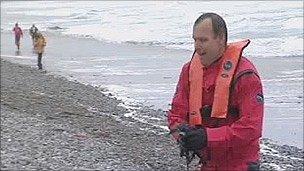Seabirds rescued from Newgale beach released from ferry
- Published
Around 60 seabirds rescued from Newgale beach in Pembrokeshire have been released into the wild from a ferry in the Irish Sea.
The fledgling Manx shearwater were trying to migrate to Argentina when they were blown off course in a storm.
More than 300 birds were taken to West Hatch wildlife centre in Taunton, Somerset, where they were being assessed for their fitness.
The RSPCA may release another 30 birds later on Friday off the Devon coast.
The charity rescued almost 500 of the seabirds from the cliffs and surf at the Pembrokeshire site on Tuesday.
It said it was the biggest bird rescues in the area since the Sea Empress oil spill in 1996.
Around 100 of the birds were put down either due to injury or because it was considered they would not survive.
BBC Wales environment correspondent Iolo ap Dafydd said the first batch of 60 rescued birds were released from a ferry travelling from Fishguard in Pembrokeshire to Rosslare in Ireland early on Friday evening.
He said other birds were being looked after before being released back into the wild.
"At the moment, the RSPCA has around 360 Manx shearwater," he said.
"These are young birds - their parents have already gone - and the wind and rain made it difficult for them.
"They were just getting ready to start this awfully long migration of 8,000 miles towards the coast of Argentina.
Survival chances

Hundreds of stranded Manx shearwater were plucked from the beach at Newgale, Pembrokeshire
"What they're trying to do in Somerset is keeping them alive by feeding them with tubes into their mouths.
"Then they hope by trying to recreate the lifestyle they had in the burrows before leaving the Welsh coastline, they can be reintroduced into the wild."
Naturalist John Hayes said it was important to release the birds as far away from the shore as possible.
"The further away from the shore they are, the better their survival chances," he said.
"If they could get out into the middle of the Irish Sea or as far away from the gulls and the dangers of the coast then all the better because we need these gulls out at sea," he said.
There are an estimated 170,000 breeding pairs of the birds on Skomer and Skokholm islands off Pembrokeshire.
- Published9 September 2011
- Published7 September 2011
- Published6 September 2011